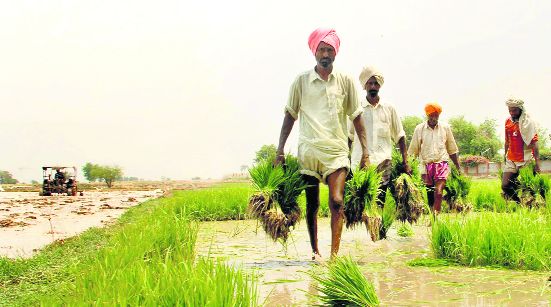
Photo for representational purpose only
Amidst the ongoing farmer agitation in the country, The Tribune takes a look at the three contentious farm Bills that have left the political parties and farming community divided. While the BJP leadership maintains the minimum support price (MSP) of crops is here to stay and that the Congress and AAP are misleading public, farmers fear the government may eventually pull out of the procurement process entirely. Sanjeev Singh Bariana attempts to decode the provisions in the legislations and farmers’ apprehensions around these
The Three Legislations
1. The Farmers’ Produce Trade and Commerce (Promotion and Facilitation) Bill, 2020
Status: Passed by Parliament
- Allows intra-state and inter-state trade of farmers’ produce beyond Agricultural Produce Market Committee (APMC) markets. State governments will not levy any market fee
- Farmers can trade produce at any place outside ‘mandis’, including farms, factory premises, warehouses, silos and cold storages
- Produce can be traded electronically in specified trade area. This allows setting up of e-trading facility for direct/online buying. These platforms can be established as companies, partnership firms or registered societies
2. The Farmers (Empowerment and Protection) Agreement of Price Assurance and Farm Services Bill, 2020
Status: Passed by Parliament
- Creates a framework for contract farming through an agreement between a farmer and a buyer prior to the production or rearing of any farm produce
- Minimum period of an agreement will be one crop season, or one production cycle of livestock; maximum is five years, unless production cycle is more than five years
- The price of farm produce should be mentioned in the agreement between the two parties
- Provides for a three-level dispute settlement mechanism — the conciliation board, sub-divisional magistrate and appellate authority
3. The Essential Commodities (Amendment) Bill, 2020
Status: Passed by Lok Sabha
- Allows Centre to regulate supply of certain food items under extraordinary circumstances (such as war and famine). Stock limits may be imposed on agricultural produce only if there is a steep price rise
- Empowers the Centre to designate certain commodities (such as food items, fertilisers and petroleum products) as essential commodities, which the Central Government may regulate or prohibit
- Imposition of stock limit on agricultural produce to be based on price rise. The increase will be calculated over price prevailing in immediately preceding 12 months, or the average retail price of the last five years, whichever is lower
Farmers’ posers to government
1 Govt will withdraw procurement of produce and leave it open to private sector. They (corporate houses), in turn, will purchase very little portion of the total produce ‘as per the high standards, which will be manipulated’. Won’t the farmers be paid a pittance for the remaining crop?
2 What was the hurry to introduce farm-related measures as ordinances in June amid Covid-19? The issues concerning lakhs of farmers deserved to be brought in as Bills allowing the Opposition a chance to debate before these were passed. Why was the Question Hour done away with?
3 The govt is making false claims about continuing with the minimum support price provision. Of the listed 23 crops, the MSP is paid only on wheat, paddy and cotton. Does the govt guarantee purchase of the listed crops on the MSP if farmers do not get the price from traders?
4 How will the govt ensure private sector pays the MSP when even the govt is not doing so?
5 Barring staged protests in support of the move by farmers in BJP-ruled states, are farmers in the rest of the country unjust in raising their voice against the Bills? Should they not even be given a hearing?
6 Why have farmers not been involved in the decision-making process on an issue that affects their lives? Officers from Punjab have said unlike major govt decisions where officials’ views are taken before formulation of policies, they were not consulted
7 Why are power and fertiliser subsidies being taken away and farmers being told they will be compensated later? What is the guarantee that farmers will be paid later? Many subsidies like on polyhouses and others have not been paid to hundreds of farmers
8 Why is the govt sidelining the arhtiyas? In emergency situations such as marriage/death in a family, banks never give loans. Charging not more than 2 per cent commission, arhtiyas have been the lifeline of the rural economy for centuries
Government contention
- Farmers can trade their produce even outside mandis
- Contract with price listed
- No market fee
- Farmers benefit from govt priority
- Bills prepared thoroughly
Farmers’ counter
- Will finish mandis, a tried & tested platform for centuries
- MSP on 23 crops not listed
- Market fee needed for infrastructure
- Why farmers not consulted?
- Why brought as ordinances?
— Analysis package based on inputs from PRS Legislative Research
Join Whatsapp Channel of The Tribune for latest updates.



























